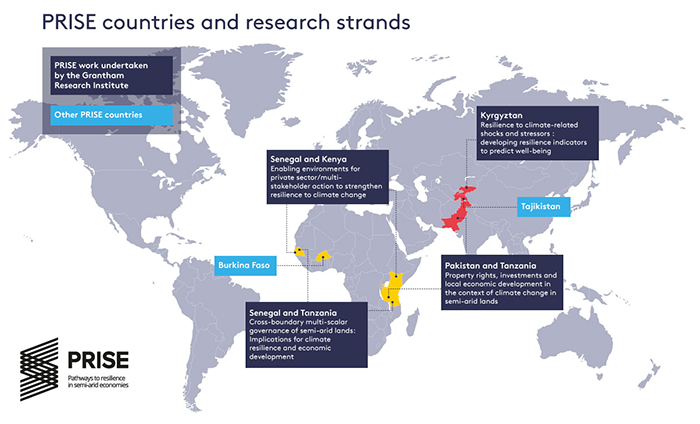Pathways to resilience in semi-arid economies (PRISE)
The Grantham Research Institute was one of the partners in the project Pathways to Resilience in Semi-arid Economies (PRISE) that ran from 2014–18 across multiple countries. The project aimed to spur climate-resilient development in African and Asian semi-arid lands by identifying economic threats and opportunities resulting from climate change. Its goal was better-informed policies and investments for climate resilience.
Semi-arid lands have been characterised as climate change ‘hotspots’, where global warming trends are expected to be particularly intense. In developing countries, they are home to around one billion people, including some of the poorest and least food-secure people in the world.
Locations and research focuses
PRISE researchers worked in Burkina Faso, Kenya, Kyrgyzstan, Pakistan, Senegal, Tajikistan, and Tanzania with stakeholders in government, business, civil society, and regional economic organisations. With their practical needs at heart, the aim was to shed light on climate risks and opportunities.
Research focuses included:
-
- Understanding the adaptation behaviours of households and businesses, including how they respond to climate risks and how they can become key agents of change for inclusive, climate-resilient development.
-
- Identifying how to deliver supportive enabling conditions and policies that equip households and businesses with the necessary incentives, resources, knowledge and skills to manage their exposure to climate risks and to maximise opportunities from climate change when they arise.
The Grantham Research Institute’s contribution to the project was focused around several strands of research:
-
- Enabling environments for private sector/multi-stakeholder action to strengthen resilience to climate change.
This strand of research focused on enabling private sector adaptation to climate change; how micro, small and medium enterprises in Kenya and Senegal, including women-led enterprises, can adapt and take advantage of new opportunities created by the dynamics resulting from climate change; and how the public sector and multi-stakeholder partnerships can incentivise this process.
- Enabling environments for private sector/multi-stakeholder action to strengthen resilience to climate change.
-
- Property rights, investments and local economic development in the context of climate change in semi-arid lands.
This area of research focused on the impact of climatic extremes on economic behaviour in Pakistan, investigating whether exposure to climatic extremes such as floods and storms affect farmers’ supply of farm and non-farm labour, as well as their savings. It also examined the role of climate-sensitive technologies in the farmers’ capacity to cope with climate change impacts, looking at semi-arid lands of Tanzania.
- Property rights, investments and local economic development in the context of climate change in semi-arid lands.
-
- Cross-boundary multi-scale governance of semi-arid lands: implications for climate resilience and economic development.
Another area focused on multi-scale governance arrangements for environmental and land-use planning in Senegal and Tanzania, examining the institutional and regulatory factors that support or constrain cross-boundary collaboration.
- Cross-boundary multi-scale governance of semi-arid lands: implications for climate resilience and economic development.
-
- Resilience to climate-related shocks and stressors in Kygyzstan: developing resilience indicators to predict well-being.
Finally, the team developed and tested in Kyrgyzstan an innovative approach to tracking household resilience over time and space, using subjective resilience indicators. They explored questions about how communities respond to climate-related shocks, and the socio-environmental factors that enable well-being in these conditions.
- Resilience to climate-related shocks and stressors in Kygyzstan: developing resilience indicators to predict well-being.
Lessons learnt from PRISE
A synthesis policy brief published at the project’s end distils broad lessons from PRISE about the kinds of policies, institutions and other public investments that can support adaptation and climate-resilient development across a broad range of public actors.
A Perspective published in Nature Climate Change highlights findings from research across the whole CARIAA programme, which PRISE is part of, into different risk assessment approaches and adaptation planning in climate change ‘hotspots’ in Africa and Asia to show the value of hybrid methods for creating more sustainable adaptation strategies.
You can also view all PRISE publications here.
Project partners and funding
The partners were: Overseas Development Institute (UK), Innovation, Environnement et Développement Afrique (Senegal), Kenya Markets Trust (Kenya), Regional Environmental Centre for Central Asia (Tajikistan), Sustainable Development Policy Institute (Pakistan), University of Central Asia (Kyrgyzstan), and University of Ouagadougou (Burkina Faso).
The PRISE project was part of the Collaborative Adaptation Research Initiative in Africa and Asia (CARIAA), funded by Canada’s International Development Research Centre and the UK Government’s Department for International Development.
For further information on the project visit the official PRISE website


